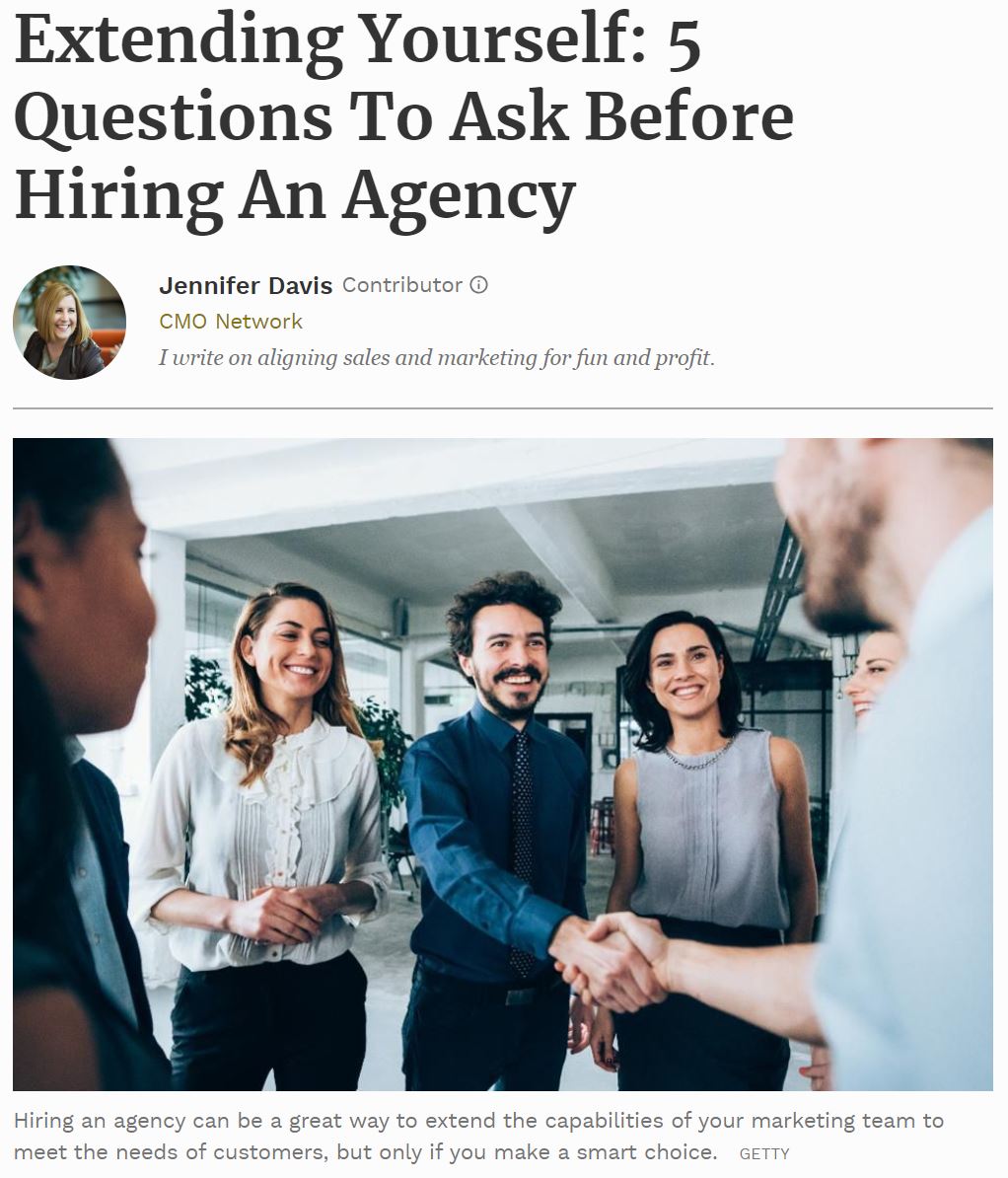In order to enable a customer-centric enterprise, marketers often work closely with agencies. Choosing and onboarding an agency for success is often the key to success of the marketing leader and their teams ability to hit their objectives. Here are five common questions that marketers should ask when selecting agencies.
Why do we need an agency?
Michelle Reape is the Director of Marketing for AssureSign, an e-signature provider, having spent time in companies like Beazer Homes, Revenue Analytics and the consulting firm North Highland where she led marketing campaigns across industries like financial services, life sciences and healthcare. She advises companies to find an agency if they do not have in-house capabilities. “For example, if you don’t have public relations or digital experience, it’s imperative to leverage the skill sets of agencies or people who do,” Reape said.
Joe Koufman leads AgencySparks, a firm that connects brands and agencies and added “companies should consider hiring an agency, if their team is missing a capability or needs additional capacity. Capacity is when the company just does not have enough 'arms and legs' to do the marketing work. Capability is when the company is missing some expertise in a specific marketing discipline, like email, social media, mobile, etc.”
That said, some companies build in-house creative, strategy or execution teams rather than relying on agencies or freelancers. If the work load is steady and understood, it can be successful. However, Koufman is skeptical of the model where companies build in-house agencies or big consultancies absorbing marketing agencies. “Talented marketing executives go to work for agencies for a reason,” he observed. Sometimes the talent you need to grow your business or execute your campaign prefer working in the highly diverse and dynamic environment of an agency, over working for a client. Other times, brands choose a hybrid model, where strategy and specialty work are done by in-house leaders and other production tasks are done by third-parties.
How do we pick an agency?
“Usually, 50% of the reason that brands select a new marketing agency partner is capability,” Koufman offered. “The other 50% is chemistry. At the end of the day, brands want to work with agencies that they like, trust, and compatible with their teams.”
“Depending on your budget and goals, it will dictate the type of agency you will need to be successful,” Reape observed. Even the term agency can vary. Koufman explains that it can be “anything from a one-person marketing consultancy to a massive holding company. For instance, WPP is now over $20 billion in revenue and made up of a slew of different types of agencies. Global consulting firms are snapping up agencies to deliver not only strategy, but also execution.”
Do we need more than one agency partner?
“Given the companies that I’ve worked for, it is very rare that you have one agency what will do everything or has the capability to do everything.” The term “agency” itself can be pretty broad. Koufman sees these same trends. “Currently, some brands are seeking a stable of specialist agencies rather than one agency-of-record. The upside is best-of-breed capabilities. The downside is the need to manage multiple agencies.”
How do we select the right partners?
Sorting from amidst the agency options and vetting agencies and proposals is a challenging process. This is further complicated by time pressures. Reape recalled a situation where she had to move a project from one agency to another mid-stream. “I learned the power of your network is crucial when you are looking for an agency to partner with.” Asking for recommendations from other leaders or marketers is a good place to start.
Reape recommends asking some specific questions to avoid problems later. Asking, “Do you have specific references or case studies where you’ve solved a similar problem in an industry that aligns with my business?” will allow you to gauge how much you will need to familiarize them with the problem and what expertise they have to bring to bear on your particular issues. Asking, “Have you ever had a project that went off track, if so, why, and what did you learn from it?” shows how self-aware they are and how committed they are to professional growth, even if it requires admitting their wrong.
Should we go with a big agency or a boutique firm?
“I have a slight bias against massive marketing agencies because I feel clients often get the ‘B’ or ‘C’ team working on their business,” Koufman observed. “The smallest client for an agency receives less attention - alternatively, the largest client for an agency is the top priority.” Reape agreed. “I like for my agencies to always consider me to be one of their largest clients. It’s all about the client experience. If an agency makes you feel like you’re the most important client, they are responsive, and do excellent work, and are good to work with, you will continue to throw that agency business,” she said. That said, the experiences can be as unique as the companies and personalities involved, so testing the relationship for chemistry and commitment is a good start.
This article was originally published on Forbes.com.



